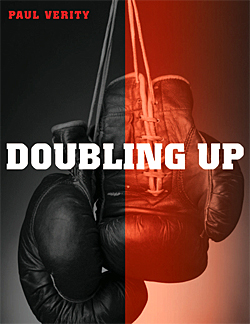 By: Paul P. Jesep*/TRT Columnist–
By: Paul P. Jesep*/TRT Columnist–
Several years ago, I had an epiphany. No, it’s not nearly as painful as it may sound. A light bulb turned on above my big head. It occurred to me that social change and awareness is often best achieved by writing fiction. Commentaries, editorials, news articles and opinion pieces last in the public mindset for a day or week. This isn’t to suggest they always have a lasting impact, but frequently it’s a narrative or good story that most people will remember and likely reflect on. Novels have a timeless message or relevance for the present and future generations.
Paul Verity’s debut novel, “Doubling Up,” tells the story about LGBTQ rights from a perspective not often heard. Matt Durant is a New Orleans lawyer in a conservative, homophobic culture, where discretion as a gay man, or one struggling with one’s identity, is a necessity for professional success. He has recently broken up with his girlfriend, “Andrea.” It is implied that the complexities of a long-distance relationship had taken their toll. He’s also a boxer who finds the sport a good way to decompress from the stresses of life.
One night he takes a cab to one of the city’s gay bars. It’s apparent from the conversation with a potential suitor, Joey Buckner, that Matt is still wrestling with living in two worlds. Joey and Matt enjoy light banter with one another until the need arises for a bathroom break. The line to the men’s room is too long, so they deem it faster to make use of an alley. Oddly, they’re the only two to do so.
They’re greeted by three knuckle-scrapers looking to engage in a hate crime. It’s the unfortunate scenario of being in the wrong place at the wrong time. Joey, a much smaller man, is the first target. In seconds, Joey is suffering from a broken nose. One of the thugs approaches Matt with a knife. Matt swings into action, giving him a series of punches and leaving him dead. The police arrive and place Matt under arrest. He’s charged with a felony.
Reluctantly, Matt calls his boss, the senior partner at the law firm. The DA, based on sloppy police work and perhaps driven by discrimination, decide to prosecute Matt on a bogus theory that he had been attempting to buy cocaine. Unbeknownst to Matt, Joey did have cocaine on him. The two surviving assailants contend that they and their now deceased friend were attempting to be upstanding citizens by stopping the sale.
Further complicating Matt’s defense is Joey’s prior arrest for cocaine possession. The plot, by the way, further thickens. Verity might be a bit too quick to get to the courtroom drama, thus leaving the reader wanting to know a bit more about Matt through greater character development.
It is apparent how Verity handles the unfolding story, as he has a background in criminal justice. The author is an attorney who successfully makes an important point in his book. Discrimination against LGBTQ folks has often been examined in a civil context and far less so from a criminal justice perspective.
Other than several minor editing issues, both grammatically and from storytelling, the book flows well and keeps the reader’s attention. Verity tells a very good story while offering a deeper message about LGBTQ justice and discrimination. Those who enjoy lawyer television shows or real life courtroom dramas are likely to appreciate Mr. Verity’s first novel. It also has the making for a fine follow-up.
*Paul is an attorney and seminary trained priest. He writes the “Faith, Family, and God” column for TRT. He can be reached at Dilovod@aol.com.







